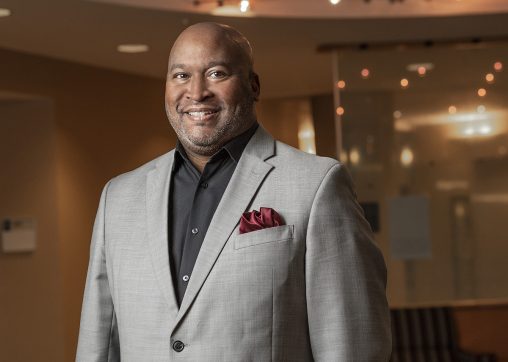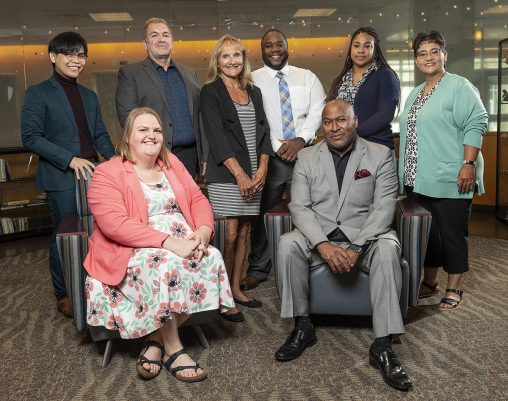
Matthew Chaney joined Wright State in June as the university’s first vice president for inclusive excellence. (Photos by Erin Pence)
Matthew Chaney, Ed.D., never expected to work in higher education. After earning his bachelor’s degree in public relations and marketing, he planned to follow his parents and other family members and work at General Motors in his hometown of Flint, Michigan.
But after a persistent mentor named Raymond Gant encouraged him to interview for a job in the Office of Minority Student Affairs at Ferris State University, Chaney’s future changed.
“I found my passion, found my why,” Chaney said.
Chaney saw firsthand the impact he could have by supporting students from marginalized backgrounds, first-generation college students.
“It really showed me how important our roles were at the institution, in student development and mentoring students,” he said.
Chaney would spend the next 26 years of his career at Ferris State in Big Rapids, Michigan, mentoring and supporting students and working on university strategic planning and diversity initiatives. He served as director and assistant director of the Office of Multicultural Student Services and assistant director of student support services.
Chaney joined Wright State University in June as the university’s first vice president for inclusive excellence, working with the campus community to foster a welcoming campus environment and institutional culture that supports diversity, accessibility, equity and inclusion for all.
He provides leadership and strategic planning for diversity and inclusion initiatives across the university, including working with campus constituents to create a comprehensive inclusive excellence plan. He also chairs the President’s Council for Inclusive Excellence, which is responsible for inclusive excellence programming for faculty, staff and students.
He is focused on building relationships and understanding where Wright State is successful and where there are gaps to fill to make Wright State a more welcoming community for students, faculty, staff and alumni.
While the Division of Inclusive Excellence can set the pace on diversity, equity and inclusion at Wright State, Chaney said it will take a collective effort to make Wright State an inclusively excellent institution.
“It’s incumbent upon all of us if we’re going to make change, if we’re going to lead the region, it’s going to take work from all of us inclusively to make Wright State a better place,” he said.
One reason Chaney was attracted to the role of vice president for inclusive excellence was the opportunity to work with and mentor students.
While he is passionate about inclusive excellence and diversity work, he said, “I think even more importantly, I’m passionate about student development.”

The Division of Inclusive Excellence includes: front row, from left: Emily Yantis-Houser, LGBTQA Center intercultural specialist; Matthew Chaney, vice president for inclusive excellence; back row, from left: Kevin Huang, Asian and Native American Center intercultural specialist; Fermín Recarte, Latino Center intercultural specialist; Cindy Vanzant, Women’s Center assistant director; Quatez Scott, Bolinga Black Cultural Resources Center intercultural specialist; Nicole Carter, Women’s Center director; and Mia Honaker, administrative assistant to the vice president for inclusive excellence.
Providing students with a quality education goes hand in hand with helping students understand that as members of the workforce they will work with people from many different backgrounds and with different experiences. Exposing students to diverse groups of people is the perfect complement to their education, he said.
“And as we do that, we begin to learn more and more what we have in common as oppose to what’s different,” he said.
A key way Chaney and the Division of Inclusive Excellence will support students is through the university’s culture and identity centers:
- Asian and Native American Center, staffed by Kevin Huang, intercultural specialist
- Bolinga Black Cultural Resources Center, staffed by Quatez Scott, intercultural specialist
- Latino Center, staffed by Fermín Recarte, intercultural specialist
- LGBTQA Center, staffed by Emily Yantis-Houser, intercultural specialist
- Women’s Center, led by Nicole Carter, Ph.D., director, and Cindy Vanzant, assistant director
Mia Honaker serves as administrative assistant to the vice president for inclusive excellence.
“Students’ voices are very important when we look at the different dynamics associated with the culture and identity centers,” Chaney said. “Those centers are doing great work and supporting students and highlighting culture at the institution.”
Chaney has started his new role at Wright State by, as he put it, “hitting the ground learning,” meeting with students, including the leaders of several student organizations, as well as faculty and staff from across the university. He plans to visit the Lake Campus soon to meet with campus leaders, faculty, staff and students.
Chaney earned his Ed.D. in community college leadership, a master’s degree in career and technical education, a bachelor’s degree in public relations and marketing, and an associate degree from Ferris State.
He grew up in Flint, Michigan, where his parents worked for General Motors. His father grew up in the Jim Crow south in Arkansas and his mother was from Decatur, Mississippi, where she was friends with civil rights leader Medgar Evers.
“I heard the stories of oppression and how people of color were marginalized, and that has fueled my desire to want to make this world a better place and to drive the work that I do,” Chaney said. “It’s driven on relationships and respect for all.”
As a Black man, Chaney has experienced racism and been denied opportunities. It drives him to make a difference.
“That always fuels me to do this work and achieve success,” he said.

 Wright State University and Premier Health more closely align operations, creating a transformational partnership
Wright State University and Premier Health more closely align operations, creating a transformational partnership  Bottom Line, Wright State partnership aims to increase access to college
Bottom Line, Wright State partnership aims to increase access to college  Wright State’s nursing program celebrates 50th anniversary
Wright State’s nursing program celebrates 50th anniversary  Wright State celebrates Student Success Champions
Wright State celebrates Student Success Champions  Wright State golf team captures 2024 Horizon League team title, Flynn individual champion
Wright State golf team captures 2024 Horizon League team title, Flynn individual champion 